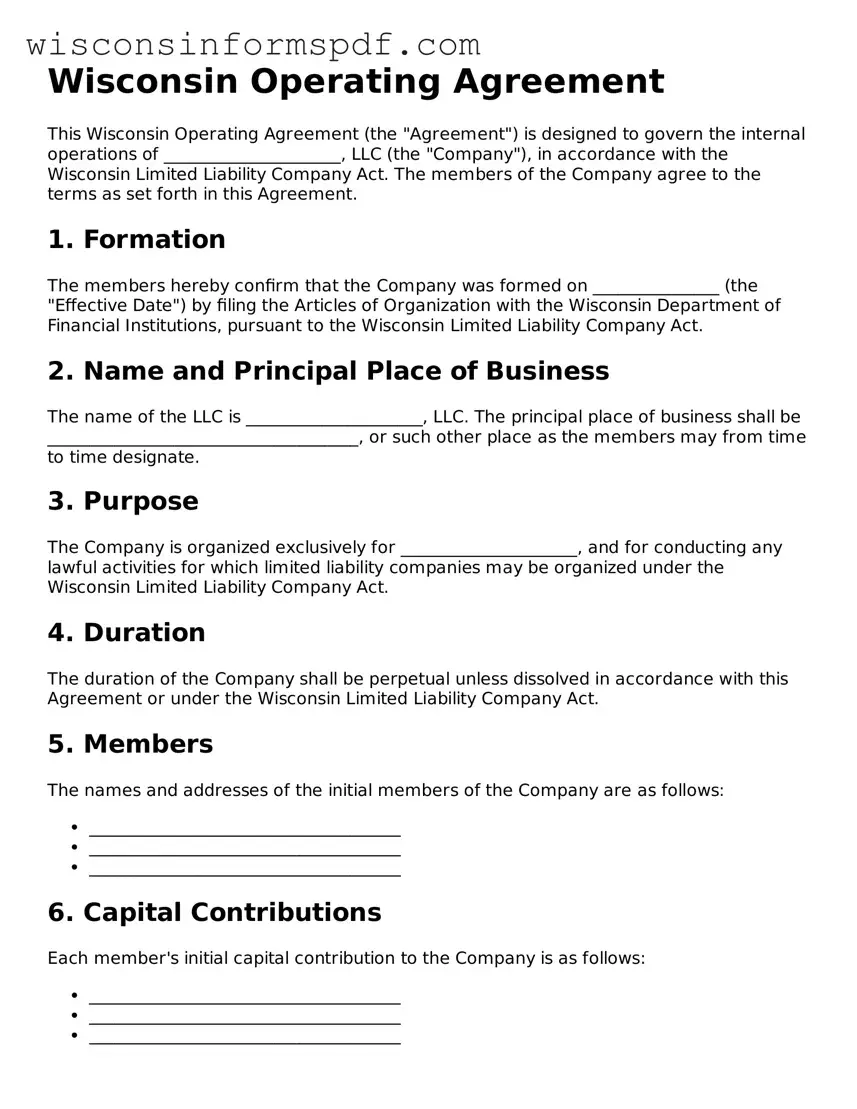Wisconsin Operating Agreement
This Wisconsin Operating Agreement (the "Agreement") is designed to govern the internal operations of _____________________, LLC (the "Company"), in accordance with the Wisconsin Limited Liability Company Act. The members of the Company agree to the terms as set forth in this Agreement.
1. Formation
The members hereby confirm that the Company was formed on _______________ (the "Effective Date") by filing the Articles of Organization with the Wisconsin Department of Financial Institutions, pursuant to the Wisconsin Limited Liability Company Act.
2. Name and Principal Place of Business
The name of the LLC is _____________________, LLC. The principal place of business shall be _____________________________________, or such other place as the members may from time to time designate.
3. Purpose
The Company is organized exclusively for _____________________, and for conducting any lawful activities for which limited liability companies may be organized under the Wisconsin Limited Liability Company Act.
4. Duration
The duration of the Company shall be perpetual unless dissolved in accordance with this Agreement or under the Wisconsin Limited Liability Company Act.
5. Members
The names and addresses of the initial members of the Company are as follows:
- _____________________________________
- _____________________________________
- _____________________________________
6. Capital Contributions
Each member's initial capital contribution to the Company is as follows:
- _____________________________________
- _____________________________________
- _____________________________________
Additional contributions shall be made only as agreed upon by all members.
7. Allocation of Profits and Losses
The Company's profits and losses shall be allocated among the members in proportion to their respective percentage interests in the Company.
8. Management
Management of the Company is vested in the members. Decisions shall be made by a majority vote of the members, except as otherwise provided in this Agreement or required by the Wisconsin Limited Liability Company Act.
9. Dissolution
The Company shall be dissolved upon the occurrence of any of the following:
- the consent of all members,
- a judicial decree of dissolution, or
- any event which renders it unlawful for the business of the Company to be carried on by the members under the Wisconsin Limited Liability Company Act.
Upon dissolution, the Company's affairs shall be wound up, and its assets distributed in accordance with the Wisconsin Limited Liability Company Act.
10. Amendments
This Agreement may be amended only by the written consent of all members.
11. Governing Law
This Agreement shall be governed by and construed in accordance with the laws of the State of Wisconsin.
IN WITNESS WHEREOF, the undersigned members have executed this Wisconsin Operating Agreement as of the date first above written.
Member's Signature: _________________________ Date: _______________
Member's Signature: _________________________ Date: _______________
Member's Signature: _________________________ Date: _______________

